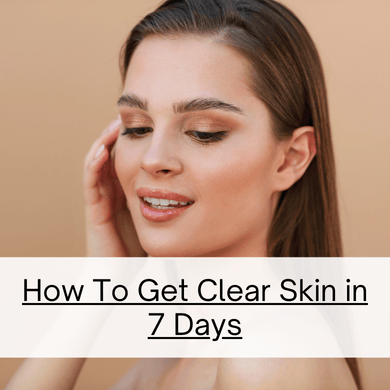Does CeraVe Cause Cancer
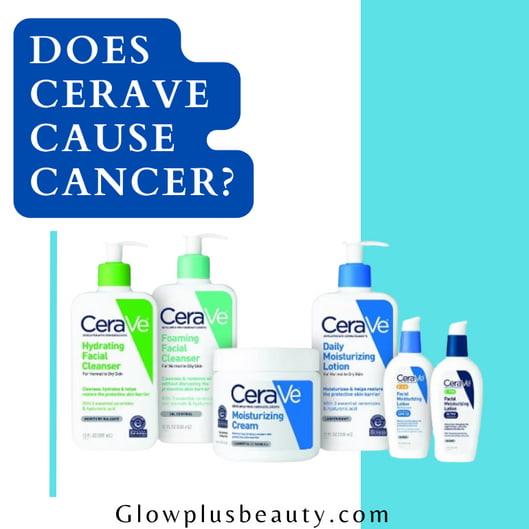
In recent times, concerns about the safety of skincare products have become increasingly prevalent, with consumers becoming more mindful of the ingredients in their daily routines.
One brand that has gained popularity for its dermatologist-recommended products is CeraVe.
CeraVe is a popular brand of skincare products that claims to be gentle, hydrating, and suitable for all skin types. Many people swear by CeraVe products for their daily routine.
Suppose, you want to use more natural and almost zero harmful skincare products for you and your loved ones, you may be curious about the safety of CeraVe products and whether they have any ingredients that could cause cancer.
But the question arises- is CeraVe safe to use? Or does it contain harmful ingredients that could increase your risk of cancer?
However, amidst the positive reviews, a question has surfaced – does CeraVe cause cancer?
In this article, we will delve into the ingredients, and scientific studies, as well as explore this question does CeraVe cause cancer?
Let’s get started.
What is CeraVe?
To understand if CeraVe products are safe or carcinogenic, we need to know more about the brand and its ingredients.
CeraVe is a skincare brand that was developed with dermatologists in 2005. CeraVe has been owned by L’Oréal, a French cosmetics company, since 2017.
The name, “CeraVe” comes from the combination of the words “ceramide” and “vehicle”, as the brand’s main feature is its patented Multivesicular Emulsion (MVE) technology that delivers ceramides and other ingredients to the skin over time.
All the CeraVe products contain three essential ceramides (ceramide 1, 3, and 6-II) to help restore the skin’s protective barrier, as well as other ingredients that support skin health and hydration.
Dermatologists favor this brand because of its non-comedogenic formulation and its effectiveness in calming sensitive skin and addressing acne concerns.
Unlike other skincare products, this brand uses only mild and gentle ingredients that can work well for any skin type.
Additionally, They are fragrance-free, non-comedogenic, and hypoallergenic, which means they are gentle and safe for your skin.
Explaining CeraVe Ingredients
The key ingredients in CeraVe products are chosen to provide hydration, repair your skin barrier, and maintain overall skin health.
Here are some common ingredients found in CeraVe products and their explanations:
Ceramides: These are essential lipids (fats) naturally found in the skin’s outer layer. Ceramides are great for maintaining the skin’s barrier function, preventing moisture loss, and protecting against environmental irritants.
Hyaluronic Acid: This acts as a potent humectant, drawing in and locking moisture into the skin. It plays a key role in maintaining skin hydration, leaving it nourished, full, and flexible.
Niacinamide (Vitamin B3): Known for its soothing and anti-inflammatory properties, niacinamide helps improve the appearance of enlarged pores, uneven skin tone, and fine lines. It also supports the skin barrier.
Glycerin: Another humectant that attracts and retains moisture, glycerin helps to keep the skin hydrated.
Dimethicone: A silicone-based ingredient that acts as a skin protectant and moisturizer. It forms a smooth layer on the skin that prevents water loss and soothes irritation.
Petrolatum: An occlusive agent that forms a barrier on the skin, preventing water loss and protecting against external irritants.
Caprylic/Capric Triglyceride: Derived from coconut oil and glycerin, this ingredient helps to replenish the skin’s surface and improve texture.
Cetearyl Alcohol: A fatty alcohol that helps to emulsify and stabilize products. Please note that, not to be confused with drying alcohol. It is safe for the skin.
Phytosphingosine: A naturally occurring lipid that contributes to the skin barrier’s health and function.
Cholesterol: An essential lipid that supports the skin barrier and helps maintain its integrity.
Benzoyl peroxide: Benzoyl peroxide is an effective ingredient for treating acne, as it kills the bacteria that cause acne and reduces inflammation.
Glycolic acid: It is an alpha-hydroxy acid that exfoliates the skin and removes dead skin cells. It also helps to improve the skin’s texture, brightness, and clarity.
Salicylic Acid: Aka BHA, an exfoliant mostly great for oily and acne-prone skin.
Is CeraVe a healthy brand?
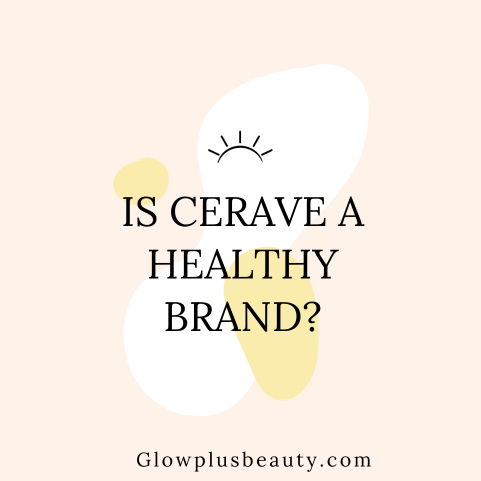
While discussing does CeraVe causes cancer, let’s talk about whether CeraVe is a healthy brand or not.
As we’ve known earlier, CeraVe is designed in collaboration with dermatologists so, It can be said that the products are trusted and safe for skin.
Moreover, CeraVe products are fragrance-free, non-comedogenic, and hypoallergenic, which means they are unlikely to cause irritation, breakouts, or allergic reactions making them effective for most skin types and concerns.
The best thing is that their products are approved by the National Eczema Association, meaning they are suitable for sensitive and eczema-prone skin.
However, no skincare brand is perfect, and CeraVe products may not work for everyone.CeraVe products are not certified as organic or natural, and they do contain some synthetic components such as dimethicone, petrolatum, or parabens.
Unfortunately, CeraVe products are also not certified as cruelty-free or vegan, as they are sold in countries where animal testing is required by law, and they contain ingredients such as cholesterol and glycerin that may come from animal sources.
The post is about does CeraVe causes cancer.
is CeraVe cruelty-free?
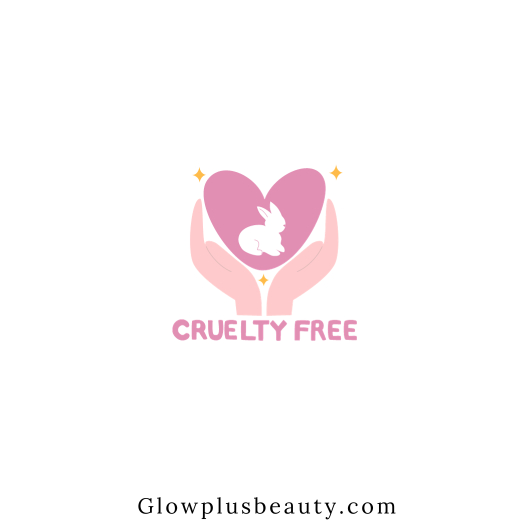
Regrettably, CeraVe is not cruelty-free. I know this is disappointing, especially if you are a fan of CeraVe products and care about animal welfare.
They test their products or ingredients on animals, either themselves, through their suppliers, or a third party.
The main reason why CeraVe is not cruelty-free is because they sell their products in mainland China, where animal testing is mandatory for all imported cosmetics.
Even though CeraVe claims that it’s the “health authorities” and not their company that test their products on animals, it’s important to note that CeraVe had to pay for these tests to be performed.
is CeraVe vegan?
For someone vegan, I’m sorry to say that CeraVe products are not entirely vegan.
While they do have some products that don’t contain animal-derived ingredients, some formulations may include ingredients like beeswax, glycerine, lanoline, or cholesterol which are derived from animals. Additionally, CeraVe is not certified as a vegan brand.
Is CeraVe a sustainable brand?
CeraVe is a skincare line that does not have a good record of sustainability.
It uses plastic packaging that is not recyclable and does not use recycled materials or carbon offsets.
Therefore, CeraVe is not a sustainable brand, and it could do much better to improve its environmental and social impact.
iS CeraVe paraben Free?
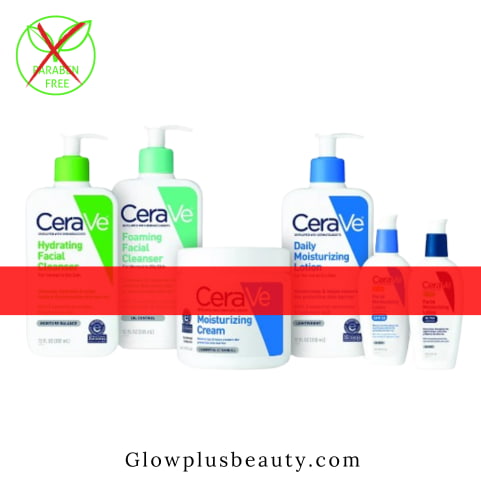
While CeraVe products offer a lot of good things, they also contain parabens. This is a factor to bear in mind.
Parabens are a type of preservative that keeps your products fresh, extends the shelf life, and protects from bacterial growth.
They are widely used in the cosmetic industry because they are odorless, colorless, and inexpensive.
While it is cheap and effective at keeping products from going bad by preventing bacteria and fungi from growing in them, It is linked to harmful health risks such as cancer and hormone disruptors.
Although some CeraVe products do have parabens, the brand says to its consumers that they are safe and follow the industry standards.
So, what should you do if you are concerned about parabens? The choice is up to you.
If you want to avoid parabens, you can look for products labeled as “paraben-free” or that use other preservatives like natural ones.
If you learn more about it, check this post,
Does CeraVe Cause Cancer?
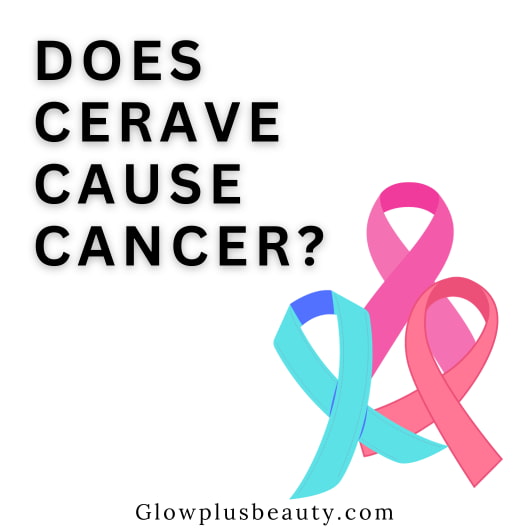
Let’s talk about the biggest controversial topic: Does CeraVe Cause Cancer?
First of all, I am being clear that there is no scientific evidence that CeraVe products cause cancer, or that any of the ingredients in CeraVe products are carcinogenic or mutagenic.
Plus, CeraVe products do not contain any ingredients that are classified as known or probable human carcinogens by (the International Agency for Research on Cancer) (IARC), which is a part of the World Health Organization (WHO) that checks if things can cause cancer.
Now, the issue ” CeraVe causes cancer” arises due to add paraben in some of CeraVe’s products.
Parabens are controversial because the safety of parabens is still not clear, and different experts have different opinions about them.
Some studies have linked them to hormone problems and cancer. However, other studies have found no evidence of such risks.
For nearly a century, parabens have been used as preservatives in various industries, such as food, drug, and cosmetics, without causing harm.
According to CeraVe, its products are safe and follow the industry norms.
Additionally, Some experts say that the amount of parabens in skincare products is too low to affect your body.
As a skincare enthusiast and a pharmacy student, I can assure you that Cerave doesn’t cause cancer.
However, you can also talk to your doctor or dermatologist if you have any questions or concerns about parabens or any other ingredients in your skincare products.
If you don’t mind using parabens, you can keep using your favorite CeraVe products without worrying too much.
Does CeraVe have toxic ingredients?
No, CeraVe products are generally considered safe and do not contain harmful components in the sense of being toxic.
Generally, toxic ingredients in cosmetics are chemicals that may cause harm to your health or the environment.
Some examples of toxic ingredients are parabens, sulfates, synthetic colors, fragrances, and coal tar. These chemicals are linked to cancer, hormone disruption, skin irritation, allergies, and other problems.
CeraVe doesn’t contain any of them except paraben, which is a low quantity that meets industrial meet since the FDA and the WHO considered paraben in small quantities
10 Toxic Ingredients that are dangerous and some of them are Linked to Cancer.
I’ll share with you 10 toxic ingredients that you should avoid at all costs in your skincare products.
These are based on scientific research and expert opinions, as well as the recommendations of the ingredients that can damage your skin and your health.
Fragrance: Fragrance can contain phthalates, a group of chemicals that are linked to reproductive problems and birth defects. According to the EWG, fragrance is one of the most common causes of allergic reactions and skin sensitization.
Sodium lauryl sulfate (SLS) and sodium laureth sulfate (SLES): These are surfactants that create foam and lather in cleansers, shampoos, and body washes. SLS and SLES can strip the skin of its natural oils and moisture, and cause irritation, inflammation, and allergic reactions.
Parabens: These are widely used preservatives that prevent the growth of bacteria and fungi in cosmetics. Parabens have been detected in breast tissue and breast milk, and some studies have suggested a link between parabens and breast cancer.
However, it’s important to note that the majority of scientific evidence available does not establish a clear link between parabens used in cosmetics and adverse health effects.
Food and Drug Administration (FDA) and the European Commission’s Scientific Committee on Consumer Safety (SCCS), have reviewed the available data and concluded that parabens are generally safe for use in cosmetics at low concentrations.
Formaldehyde: This is a known carcinogen that can be released by some preservatives, such as quaternion-15, DMDM hydantoin, and imidazolidinyl urea. Formaldehyde can cause skin irritation, allergic reactions, and respiratory problems.
According to the International Agency for Research on Cancer (IARC), Formaldehyde is considered a human carcinogen.
Coal tar: This is a by-product of coal processing that is used as a colorant and anti-dandruff agent in some hair products. Coal tar is a known carcinogen that can cause skin irritation, inflammation, and photosensitivity. Coal tar also contains polycyclic aromatic hydrocarbons (PAHs), which are environmental pollutants that can damage DNA and cause cancer. The IARC classifies coal tar as a human carcinogen.
Triclosan: This is an antibacterial agent that is added to some soaps, toothpaste, and deodorants.
Triclosan, found in products like soaps and toothpaste, can mess with the good bacteria on your skin and mouth. It may also make bacteria stronger against antibiotics. To be safe, you might want to choose products without triclosan.
Moreover, Triclosan can also interfere with thyroid function and hormone regulation and has been linked to liver toxicity and cancer.
Key Note:
The U.S. Food and Drug Administration (FDA) has banned triclosan from over-the-counter antiseptic products, and the EWG urges consumers to avoid products that contain triclosan.
Talc: This is a mineral that is used as an absorbent and anti-caking agent in some powders, blushes, and eyeshadows.
Talc can be contaminated with asbestos, a known carcinogen that can cause lung cancer and mesothelioma. Talc can also cause ovarian cancer if it is applied to the genital area or inhaled.
Petroleum: This is a crude oil derivative that is used as an emollient and occlusive agent in some moisturizers, lip balms, and hair products. Petroleum can clog the pores and prevent the skin from breathing and eliminating toxins. Petroleum can also be contaminated with PAHs, which are carcinogenic and can cause skin aging and damage.
Synthetic colors: These are artificial dyes that are added to cosmetics to enhance their appearance. Synthetic colors are usually labeled as FD&C or D&C, followed by a number and a color. Synthetic colors can cause skin irritation, inflammation, and allergic reactions. Some synthetic colors have also been linked to cancer.
The post is about does CeraVe cause cancer.
Fact and Myth about CeraVe
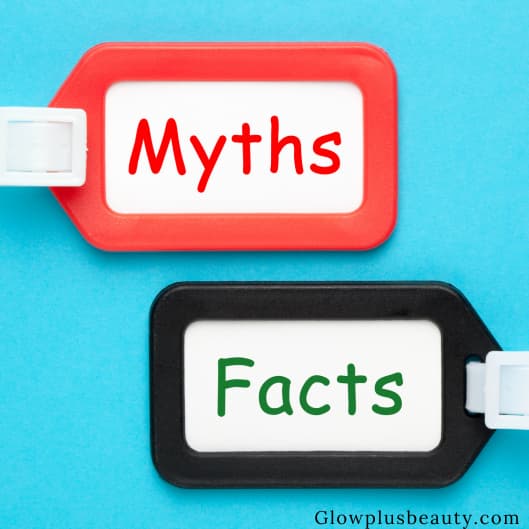
Many rumors and myths are circulating online about CeraVe and its ingredients, especially regarding their safety and potential link to cancer.
Here are some of the most common ones, and the truth behind them:
Myth: CeraVe contains phthalates, which are endocrine disruptors and carcinogens.
Fact: CeraVe does not contain phthalates, which are a group of chemicals that are used to make plastics more flexible and durable.
Phthalates are often found in fragrances, nail polishes, and personal care products, but CeraVe products are fragrance-free and do not list any phthalates in their ingredient lists.
Myth: CeraVe contains parabens, which are preservatives that mimic estrogen and cause breast cancer.
Fact: CeraVe does contain parabens, which are a group of chemicals that are used to prevent the growth of bacteria and fungi in cosmetic products. Parabens are widely used in the cosmetic industry, and they are considered to be safe and effective in low concentration by the FDA and the European Commission.
However, there is no conclusive evidence that parabens cause breast cancer, or that they are harmful to human health at the levels found in cosmetic products.
Myth: CeraVe contains sulfates, harsh detergents that strip the skin of its natural oils and cause irritation and inflammation.
Fact: CeraVe does not contain sulfates, which are a group of chemicals that are used to create foam and lather in cleansing products.
Sulfates are often found in shampoos, body washes, and toothpastes.
However, CeraVe products do not list any sulfates in their ingredient lists.
Instead, they use gentle surfactants, such as sodium lauroyl lactylate and Cetearyl alcohol, that cleanse the skin without drying it out or causing irritation.
Myth: CeraVe contains formaldehyde, a known carcinogen, and a skin sensitizer.
Fact: CeraVe does not contain formaldehyde, which is a gas that is used as a preservative and a disinfectant in some cosmetic products. Formaldehyde is a known human carcinogen, and it can cause skin irritation, allergic reactions, and respiratory problems.
Nevertheless, CeraVe products do not list formaldehyde in their ingredient lists, and they do not use any formaldehyde-releasing preservatives, such as DMDM hydantoin, quaternium-15, or imidazolidinyl urea.
FAQs About Does CeraVe cause cancer?
Are there potential side effects associated with the use of CeraVe?

Using CeraVe products is generally safe and effective for most people, but a few might notice some minor things. Like, you might get a bit red or tingly, especially if your skin is super sensitive. Some might be allergic to specific ingredients, but that’s not the norm.
Common side effects include skin irritation, rash, itching, or dryness.
These side effects are usually mild and go away on their own, but if they persist or get worse, you should stop using the product and talk to your doctor.
Are CeraVe products hypoallergenic?

Yes, CeraVe products are generally considered to be hypoallergenic, which means they are less likely to cause allergic reactions than products without this label.
If you’re in search of a product that’s gentle on the skin and less likely to cause allergies, CeraVe has got you covered!
They are formulated to minimize the risk of allergic reactions. Their products are designed to be gentle and suitable for a wide range of skin types, including sensitive skin.
However, it’s important to note hypoallergenic does not mean allergy-proof, and some people may still be sensitive to certain ingredients in CeraVe products.
If you have known allergies or concerns about certain ingredients, it’s a good idea to check the product’s ingredient list before using it.
Final thoughts: Does CeraVe cause cancer?
CeraVe is a well-reputable brand in combination with dermatologists that offers gentle and hydrating products for all skin types.
It is also free from harsh components and harmful ingredients that cause harm to the body.
So, Does CeraVe cause cancer?’
There is no major cancer-causing element in the products. But it is a good idea to check the ingredients list before using them.
If you are still not convinced and concerned about paraben, consult your doctor or dermatologist before applying any new product.
If you liked this post, please share it by pinning it!
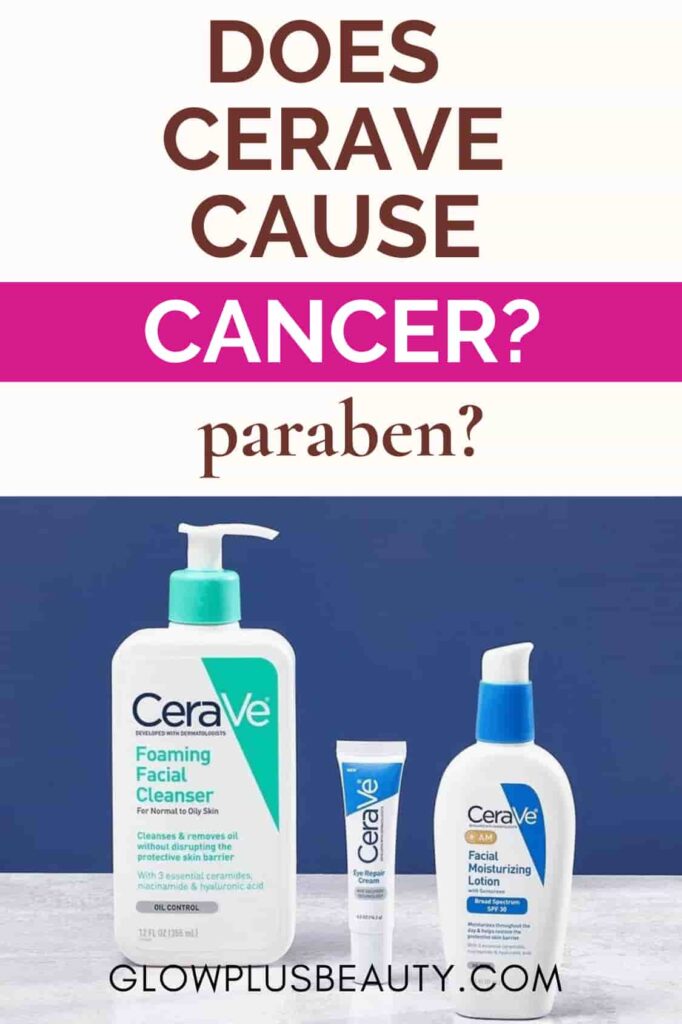
The post is about does CeraVe cause cancer.
Related posts:
Is CeraVe Cleanser Halal For Skin?



